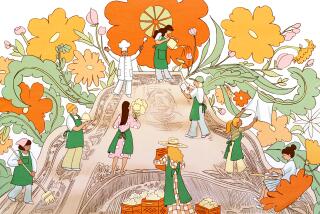SOUTHERN CALIFORNIA ENTERPRISE : Souplantation Is Putting Stock in a Piping Hot Future : Restaurants: San Diego-based chain, betting that the worst is past, has cooked up ambitious expansion and debt-buyback plans.
- Share via
Souplantation is no stranger to hot water, having survived overexpansion of its soup-and-salad restaurants and under-expansion of the economy.
But the newly public San Diego-based company, known formally as Garden Fresh Restaurant Corp., is betting that those wilted salad days are over.
Garden Fresh went to market on May 17, selling 1.5 million shares of stock over the counter for $9 per share, using the Nasdaq ticker symbol LTUS (the ticker symbol SALD was already taken). The company estimates it will receive about $12 million, which will be used to retire debt and open several restaurants under the names Souplantation and Sweet Tomatoes.
Company officials declined to be interviewed, citing securities regulations mandating a “quiet period” in the days surrounding a public offering, during which a company must not perform unusual promotional activities.
Still, an examination of Garden Fresh’s stock prospectus shows a company with an uneven earnings history that has settled down in the last several months. But the company is also planning an expensive debt buyback and a costly expansion that will affect earnings in the future.
What’s more, the salad buffet restaurant idea that was so popular in the 1980s has become a bit droopy in the Whiny ‘90s.
“I can’t really call it a healthy segment of the market,” said Laurie Lively Smith, an analyst with the Seidler Cos., a Los Angeles brokerage firm. “But Souplantation has performed better than its competition.”
Souplantation was serving up its soup-and-salad vision at two San Diego restaurants in 1983 when management consultants Michael Mack and Tony Brooke happened on them, sent by Brooke’s father, who had enjoyed a meal there. The two bought the company and it expanded throughout the ‘80s. The centerpieces at all of the company’s now 33 restaurants are the two 55-foot-long salad bars filled with salad fixings and prepared salads. Other bars feature soups, baked goods, pasta, yogurt and fresh fruit.
The format is all-you-can-eat, with prices ranging from $5.49 to $6.99 at lunch and $6.99 to $7.49 at dinner, depending on the location.
The company says it emphasizes service and food quality. Diners are greeted at the door and, after they load their plates with towers of salad, are escorted to their tables. Salad bars are continually cleaned, and the offerings are replaced frequently. Company officials try to respond in writing to all customer complaints and suggestions.
A companywide computer system keeps track of what is selling and what isn’t at each restaurant. Fixed-price supply contracts help control cost fluctuations in the fruits and vegetables on which Souplantation depends.
“The concept is a positive one,” said Bob Sandelman, a Brea-based consultant who conducts consumer surveys for restaurant chains.
“As we age, we’re more concerned about the expansion of our midsections and the calories and the fat of what we put into our mouths,” he said. “People are just much more aware of what is good and what is bad for them.”
Souplantation scores well in his consumer surveys, Sandelman said.
“They are well rated [by consumers] in freshness of the food, variety and value,” he said. “Those are aspects that the consumer perceives positively.”
“They do well,” Sandelman said. “At the one near me, it doesn’t matter what day of the week it is, there’s always a line.”
But Garden Fresh has gone to seed more than once.
In 1991, profits disappeared after a 13-month building boom that took the Souplantation chain to 25 restaurants from 13--all of them company owned. Mack resigned as chief executive, although he remained as a director, and longtime restaurant industry executive John Bifone was hired. Bifone returned the company to profitability and raised much-needed cash through the private sale of $7.7 million in subordinated notes.
But, according to the prospectus, several restaurants continued to “under-perform” in fiscal 1992 and 1993, and average sales per restaurant declined. In 1994, Mack was reappointed president and chief executive. (His original partner, Brooke, is still a director.) Bifone got a $140,000 one-year consulting contract and title to his company car.
With Mack’s return, the company conducted a complete strategic review of its operations and launched a campaign to reduce expenses, spruce up the restaurants, shift its expansion focus to outside California and change its marketing.
For the six months ended March 31, Garden Fresh earned $585,000 on revenue of $28.8 million, compared to a loss of $396,000 on revenue of $28 million for the same period of fiscal 1994. The net loss totaled $335,000 for all of fiscal 1994 on revenue of $59.7 million.
“They have shown pretty good increases in same-store sales in the last 18 months or so, which is a reflection of some positive marketing programs that they’ve put in place,” said stock analyst Smith. “They seem to be getting some good returns, particularly from the stores that are outside California.
“On the other hand, they are talking about a unit expansion that is projected to accelerate pretty rapidly,” she said, noting that the company added two stores in the fiscal year ended Sept. 30, 1994, will open three in fiscal ’95 and seven more in fiscal ’96.
“While they seem to be doing well in the stores they have now,” she said, “I would be a little bit cautious. Their growth strategy is aggressive.”
Garden Fresh warns in its prospectus that the costs of early retirement of its debt and the issuance of a stock dividend to holders of some classes of company stock make it “substantially certain” that the company will report a loss for fiscal 1995.
More to Read
Inside the business of entertainment
The Wide Shot brings you news, analysis and insights on everything from streaming wars to production — and what it all means for the future.
You may occasionally receive promotional content from the Los Angeles Times.










